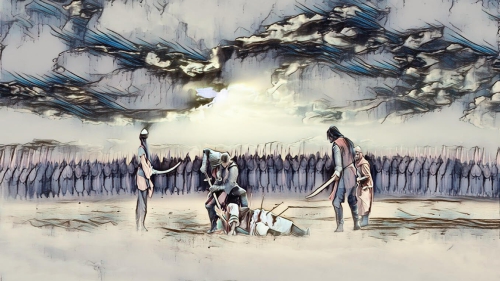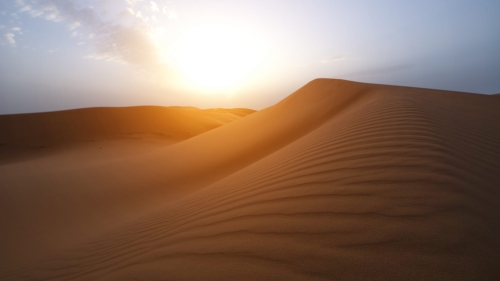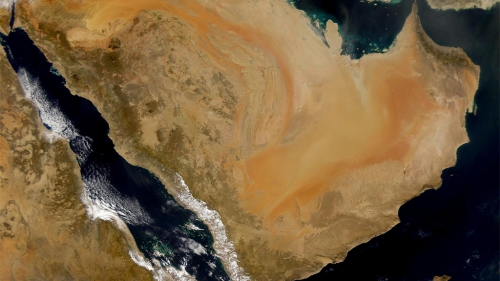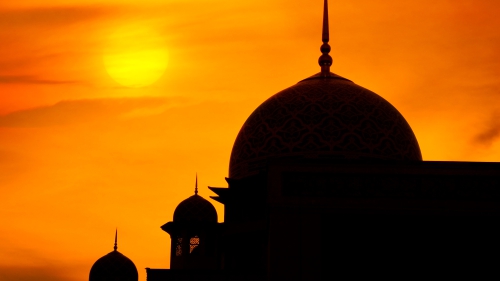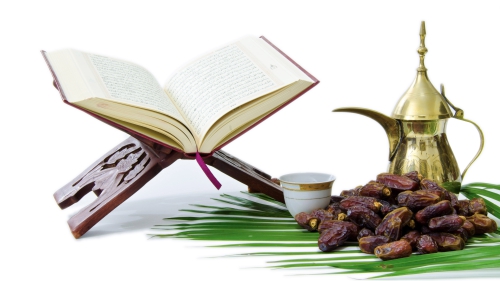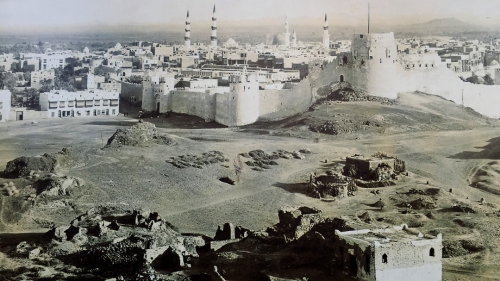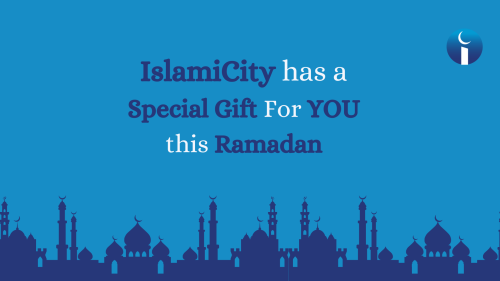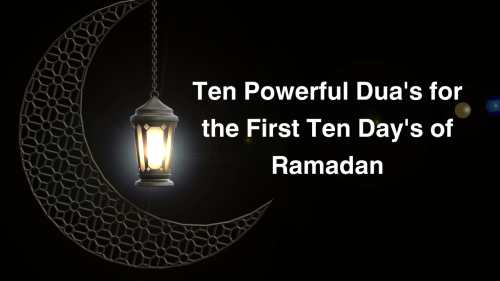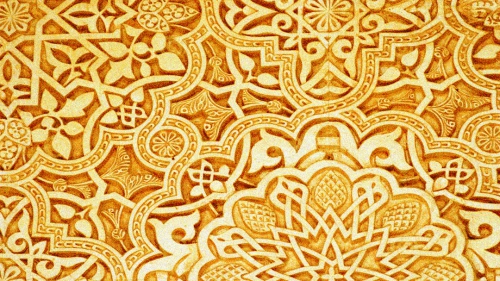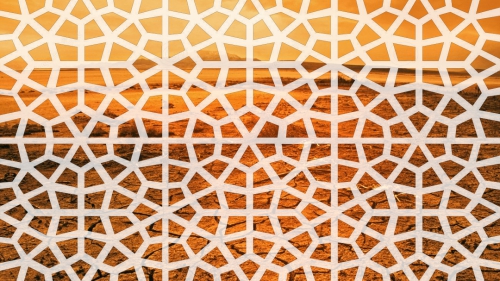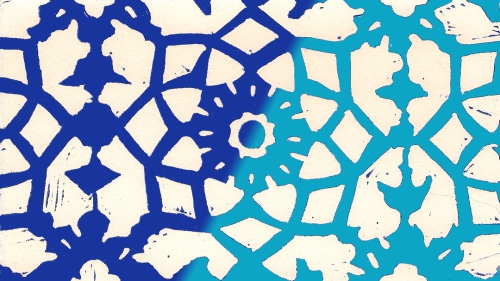Ramadan and the Unity of Islamic Ummah
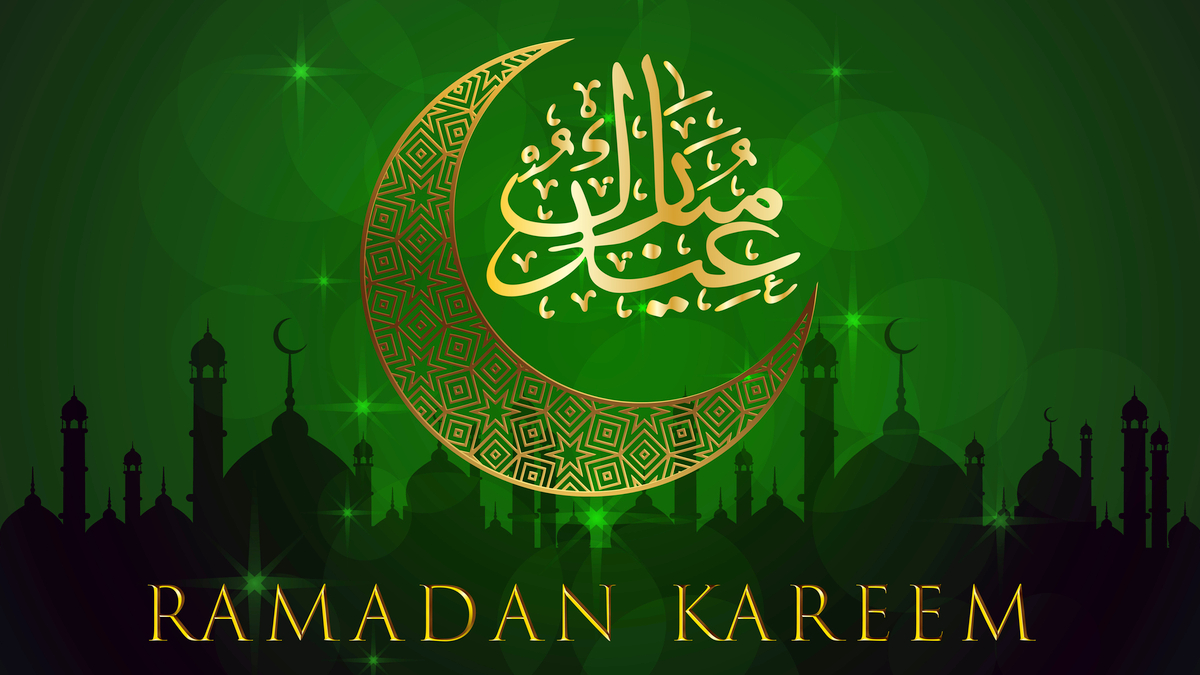
Instituted in Medina in the year 624, the Ramadan fast is a commemoration of the first revelation made to the Prophet Muhammad (PBUH) in the ninth month of the lunar year. It is a time of joy and generosity, where the individual is attentive to the neediest and strengthens the links with the religious community. The practitioner observes prayer, strict daytime abstinence, and the rite of breaking the fast at sunset.
The Origin
Ramadan is one of the months of the Islamic calendar. It was also part of the ancient Arabic calendars. The name Ramadan comes from the Arabic root RMD and the words “ramida“ or "ar-ramad", which means "scorching heat".
On this particular point Sheikh Mubarak Ahmad writes:1
“According to Ibn-Hisham, the Quraish tribe of Mecca used to retire to Mount Hira for religious devotion and penance during the month of Ramadan, abstaining from sex, etc., although this month was not regarded as a sacred month among the four pre-Islamic sacred months of Qa‘dah, Hijjah, Muharram and Rajab. “
And he goes on to say:
“The word Ramadan is an Islamic name as prior to Islam it was known as Nataq (Fath-ul-Bayan). The word is derived from ramada. They say “ramada al-salimu”, that is the inside of the man fasting became very hot with thirst (Lane). The month is so named because firstly, fasting in this month produces heat and burning due to thirst; secondly, worship in this month burns away the traces of sin in man (Asakir and Mardawaih) and thirdly, the necessary warmth of love for the Creator and His Created beings is generated in the hearts of those who fast. “
Ramadan is considered a good deed burning away sins. In the year 610, the angel Gabriel appeared to the prophet Muhammad and revealed to him the Qur’an, the Islamic holy book. This revelation, Laylat al-Qadr - or the "Night of Destiny" - is said to have taken place during Ramadan. Muslims fast during this month to commemorate the revelation of the Qur’an.
From a religious point of view, the importance of Ramadan is not simply due to the fact that its prescriptions are detailed in the Holy Book. It is the fourth pillar of Islam along with the profession of faith, prayer, almsgiving, and the pilgrimage to Mecca for those who can afford it. It was during the second year of the Prophet's installation in Medina that fasting became obligatory. At that time, this practice was not unknown to the inhabitants of the Arabian Peninsula, some of whom were Jews or Christians.
Ramadan has both religious and historical significance. It is respectively the month of the capture of Mecca by the Prophet in the year 8 of the Hegira (630), the month of the birth of Hussein, Muhammad's grandson, and the month of the death of Khadija, his first wife. More importantly, it was during the month of Ramadan that the Muslims recorded their first military victory against their Meccan enemies in the year 2 of Hegira (624) during theBattle of Badr. This is significant because it is this historical landmark that Muslim extremist groups point to when they attempt to justify their increased activism and violent actions during Ramadan.
Ramadan, A Spiritual Journey
Ramadan is not only about abstinence from food - from sunrise to sunset - but more about a spiritual journey where the Muslim seeks to get closer to excellence by purifying his soul and shedding his evil inclinations. On this particular point Mike Buchman writes:2
"Fasting is a holistic spiritual experience that poses a huge question mark for those who grasp the wisdom behind this obligation: A fasting person should ponder on the spirit of caring and sharing which fasting develops in Muslims. All fasting Muslims share the same pain, hunger, thirst, and bitterness of deprivation while fasting with the poor and needy. Ramadan creates a social and humanitarian context that fosters compassion for the needy around the world. By our voluntary hunger and thirst, we realize what it means to be deprived of basic necessities of life. Ramadan is a time to remember and help those who are less fortunate. Moreover, all Muslims also feel the joy of breaking their fast and relish thankfulness to God. The poor people rejoice at their wealthy brothers who are sharing their pain and suffering with them. They rejoice at the thought that their wealthy brothers help them to ward off the scourge of hunger and bitter deprivation. Fasting rejuvenates the concept of social solidarity among the community."
This month is also the month of generosity and sharing. Islam reminds us of the benefits of generosity towards one's fellow man in general. The month of Ramadan is an opportunity to surpass oneself. Muslims try to perform a maximum of optional prayers, invocations, and make donations as much as possible. During this month, the relationship with God is such that he feels very little hunger, thirst, or fatigue; and his heart is calm and at peace.
Ramadan is a true spiritual source that nourishes the soul, enhances faith and piety. This month increases tenfold the divine rewards of religious practice, brings Muslims closer together, and revives faith. A Ramadan without prayer or reading the Holy Qur'an has no value in itself: fasting is certainly a condition, but religious practice is inseparable from Ramadan. Sharing, generosity, and love for one's neighbor are the intrinsic values of a Muslim, and this blessed month is an opportunity for him to put them forward by inviting the needy to break the fast at his home or to give his time to charitable actions and undertakings generously.
Thus, Muslims have the duty to pray, to reflect on the place of faith in their lives, and on how to develop their human qualities, such as patience, gentleness, compassion, and humility. Finally, they practice almsgiving called zakat al-fitr, which consists of paying an obligatory tax to the mosque or to an individual in need, just before the end of Ramadan. At nightfall, the faithful gather with family and friends to eat a festive meal. On the first day of the following month, Eid al-Fitr, the festival of breaking the fast, is celebrated.
The month of Ramadan is a unique opportunity in the year to get closer to God the Almighty. The things one can do during this month, the devotion one has, are incomparable with the rest of the year. This can be seen in the number of people who attend mosques during this month: the attendance doubles. And there too, is a unique atmosphere where the members of the community meet more often for the five prayers and take time to discuss after the night prayer.
The fast aims to bring the faithful closer to God through sacrifice, remembrance, and more intense spirituality. It is also a month of gratitude during which the faithful remember the sufferings of the less fortunate. Islam also requires the faithful to distance themselves from material pleasures and focus on their thoughts and actions. Fasting is seen as physical and spiritual purification. Muslims often donate to charitable organizations during Ramadan. Many spend more time at the mosque or use their free time to recite the Holy Qur’an.
Fasting allows one to grow in stamina, the strength of will, self-discipline, and introspection, which are indispensable qualities for submission to God. At the same time, it exercises one's soul to fear God and to grow in piety. It is about depriving oneself to promote spirituality and reflection. The idea is not to stop eating as a ritual in itself, it is also a form of control and asceticism.
Let us remember that piety is a devotion, a respectful and fervent attachment to God and to the religion. This implies adherence to and respect for all the principles and precepts advocated by Islam, as well as what comes under the obligations and what does not. These include prayers, invocations, fasting, charity, almsgiving, reading the Holy Qur’an, spiritual retreat, etc. It is recommended to avoid everything that is contrary to God's will, including hypocrisy, cheating, stealing, lying, violence, adultery, murder, wickedness, corruption... in short, all the vices and everything that can pollute our spirit. However, every human being is likely to commit sins; the point here is to make efforts to get closer to God by multiplying acts of faith and piety.
(Surah 2, Verse 177) can guide us in this process and especially in this holy month of Ramadan.
"Righteousness is not that you turn your faces toward the east or the west, but [true] righteousness is [in] one who believes in Allah, the Last Day, the angels, the Book, and the prophets and gives wealth, in spite of love for it, to relatives, orphans, the needy, the traveler, those who ask [for help], and for freeing slaves; [and who] establishes prayer and gives zakah; [those who] fulfill their promise when they promise; and [those who] are patient in poverty and hardship and during battle. Those are the ones who have been true, and it is those who are righteous."
Let us also emphasize that the month of Ramadan is on the one hand, socially beneficial by leading the community more to the organization, communion, sense of responsibility, solidarity, equality, justice, love, etc. On the other hand, it contributes to the improvement of health, in particular by promoting the elimination of toxins and excess fat, by cleansing the digestive organs, etc. It is a school that teaches us to go beyond our aspirations, our desires, our instincts, our egoisms... in order to seek the proximity of God who brings us wisdom, peace of heart, the light of the mind, etc.
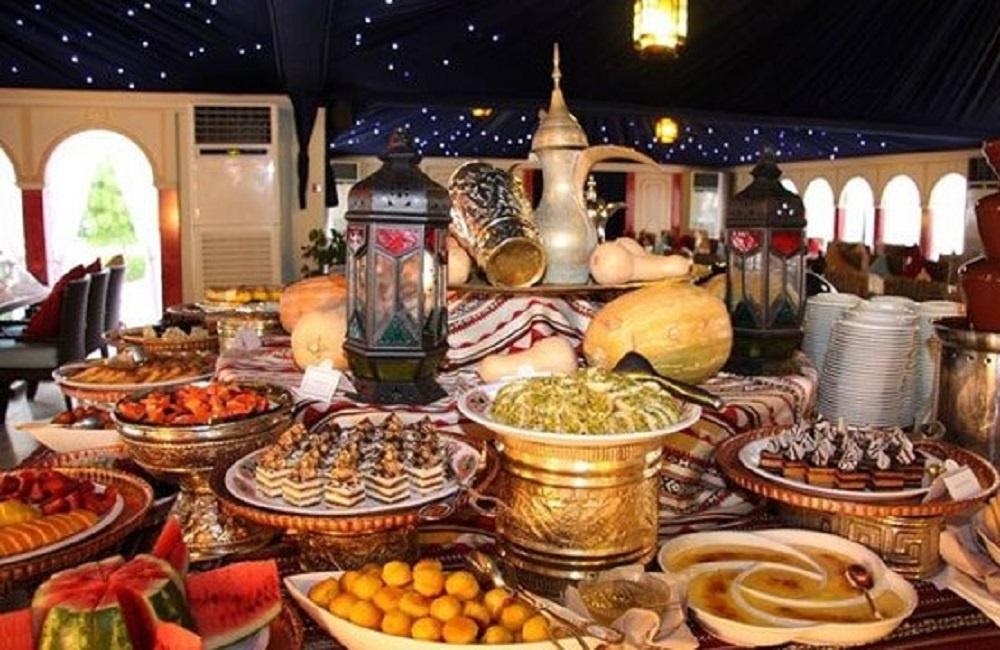
Photo: Sharing Ramadan food with the needy is a moral obligation
Fourth of the five pillars of Islam, it is obligatory and corresponds for the believers to a period of rupture, of stripping, of sharing: everyone must abstain from drinking, eating, smoking, and having sexual relations from sunrise to sunset. In this regard, Allah the Almighty, says:
"Believers! Fasting is enjoined upon you, as it was enjoined upon those before you, that you become God-fearing." (2:183)
يٰٓـاَيُّهَا الَّذِيۡنَ اٰمَنُوۡا كُتِبَ عَلَيۡکُمُ الصِّيَامُ کَمَا كُتِبَ عَلَى الَّذِيۡنَ مِنۡ قَبۡلِکُمۡ لَعَلَّكُمۡ تَتَّقُوۡنَۙ
Only the sick, pregnant women, or travelers can avoid it, but they will have to "compensate" by other days of abstinence during the year or by giving alms.
"Fasting is for a fixed number of days, and if one of you be sick, or if one of you be on a journey, you will fast the same number of other days later on. For those who are capable of fasting (but still do not fast), there is redemption: feeding a needy man for each day missed. Whoever voluntarily does more good than is required, will find it better for him;184 and that you should fast is better for you if you only know." (2:184)
اَيَّامًا مَّعۡدُوۡدٰتٍؕ فَمَنۡ كَانَ مِنۡكُمۡ مَّرِيۡضًا اَوۡ عَلٰى سَفَرٍ فَعِدَّةٌ مِّنۡ اَيَّامٍ اُخَرَؕ وَعَلَى الَّذِيۡنَ يُطِيۡقُوۡنَهٗ فِدۡيَةٌ طَعَامُ مِسۡكِيۡنٍؕ فَمَنۡ تَطَوَّعَ خَيۡرًا فَهُوَ ٗ ؕ وَاَنۡ تَصُوۡمُوۡا خَيۡرٌ لَّـکُمۡ اِنۡ كُنۡتُمۡ تَعۡلَمُوۡنَ خَيۡرٌ لَّه
The practitioner may freely choose another time of the year, as long as the fast is performed according to the rules and in continuity. Deliberately stopping the fast, missing days, or breaking any of the rules will result in an additional two months of fasting for each day missed. This atonement fast may be substituted for a monetary or food donation for those in need. This is also the case for those who are exempt, such as the chronically ill or pregnant women, who cannot fast without endangering their lives.
Caring and Sharing
Apart from prayer, strict regulations on the control of bodily needs and pleasures punctuate the daily life of the believer. The believer must abstain from drink, food, sex, and desire from dawn until sunset. At that time, he breaks the fast with a balanced, lean meal and will eat a second meal just before daybreak: suhûr. Ramadan, though obligatory, is flexible. It shows an understanding attitude towards the individual practitioner.
This act of generosity towards the needy is not locked in the register of punishment but in an awareness of life in the community. A true celebration, Ramadan, which advocates individual deprivation, is also a form of solidarity and food sharing that goes beyond family and religious boundaries. The individual act of faith goes hand in hand with the desire for collective social justice.
Three time periods of ten days punctuate the month and the intention of the believer's prayers. The first is devoted to soliciting God's blessing. The second is turned to repentance and forgiveness. During the third, one seeks protection from the fires of hell. Ramadan culminates on one of the odd nights of the last time period: this is the “Night of Destiny “(Laylat-al-Qadr), a night that "equals a thousand months" according to the Holy Qur’an:
"(97:1) Behold, We revealed this (Qur'an) on the Night of Power.
(97:2) And what do you know what the Night of Power is?
(97:3) The Night of Power is better than a thousand months.
(97:4) The angels along with the Spirit3 descend in it by the permission of their Lord4 with all kinds of decrees.
(97:5) All peace is that night until the rise of dawn."
بِّسْمِ اللَّهِ الرَّحْمَنِ الرَّحِيمِ إِنَّا أَنزَلْنَاهُ فِي لَيْلَةِ الْقَدْرِ 1
وَمَا أَدْرَاكَ مَا لَيْلَةُ الْقَدْرِ 2
لَيْلَةُ الْقَدْرِ خَيْرٌ مِّنْ أَلْفِ شَهْرٍ 3
تَنَزَّلُ الْمَلَائِكَةُ وَالرُّوحُ فِيهَا بِإِذْنِ رَبِّهِم مِّن كُلِّ أَمْرٍ 4
سَلَامٌ هِيَ حَتَّى مَطْلَعِ الْفَجْرِ 5
It is invaluable because it is closely related to the Qur'an. There are at least five merits of Laylat-Al-Qadr:
a - The Qur'an was revealed on the night of Destiny: " Behold, We revealed this (Qur'an) on the Night of Destiny. " (Qur'an 97:1).
b - It is better than a thousand months or 83 years and 4 months: " The Night of Destiny is better than a thousand months. "(Qur'an 97:3).
c - God erases all previous sins:
The Messenger of Allah (PBUH) said: "Whoever stands (in the voluntary night prayer of) Ramadan out of faith and in the hope of reward, his previous sins will be forgiven. And whoever spends the night of Lailat Al-Qadr in prayer out of faith and in the hope of reward, his previous sins will be forgiven."3
َ قَالَ رَسُولَ اللَّهِ صَلَّى اللَّهُ عَلَيْهِ وَسَلَّمَ مَنْ قَامَ رَمَضَانَ إِيمَانًا وَاحْتِسَابًا غُفِرَ لَهُ مَا تَقَدَّمَ مِنْ ذَنْبِهِ وَمَنْ قَامَ لَيْلَةَ الْقَدْرِ إِيمَانًا وَاحْتِسَابًا غُفِرَ لَهُ مَا تَقَدَّمَ مِنْ ذَنْبِهِ
d - God answers all invocations on this night.
God frees as many people from hellfire on this night as He has freed since the beginning of Ramadan.
It commemorates the exact moment when the Qur'an was revealed to the Prophet Muhammad (PBUH). Likely to occur on any night of the last decade, the "Night of Destiny" and the great benefit it offers would be revealed to the believer who diligently sought it out through prayer and observance of the fast, just as the Qur'an revealed itself to the Prophet."
Fasting in the Religions of the Book
But as verse (2:183) of the Holy Qur’an, given above, indicates, religious fasting is a practice that predates Islam. The faithful of Abraham fasted at eclipses, equinoxes, and solstices. The Israelite religion has periodic fasts, of which Yom Kippur4 is the most famous. Lent is a period of 40 days, where the Christian prepares for Easter each year by fasting. The Sabeans fasted 30 days a year; the most pious fasted on Sunday and Monday. Zoroastrians, totemists, American Indian priests fast on various occasions.
According to “Cultural Awareness International “fasting is a common practice among many religions and philosophies:5
“Religions and philosophies that practice fasting include: Buddhism, Christianity, Islam, Judaism, Taoism, Jainism, and Hinduism. Fasting can last for just a few hours or even a few weeks, usually with practitioners eating at night. Interestingly, even within a religion, different denominations or sects may fast differently or at different times. For example, within Christianity, there are several different denominations that fast at different times. Catholics do not eat meat on Fridays during Lent, while Coptic Christians, the main form of Christianity in Egypt, fast for different durations for a total of 210 days throughout the year. They have eight main fasts, and each lasts for a different duration and restricts the diet in a unique way. “
Among the Jews, atonement, and forgiveness from Yahweh
This practice was already deeply rooted in the Judeo-Christian tradition, as shown by the numerous references in the Old Testament. On several occasions, the Jewish people fasted to put an end to a calamity, to expiate their faults, or to ask Yahweh's forgiveness. If the religion of the Hebrews was built in opposition to the magical dimension of Mesopotamian beliefs, it took on certain principles, notably dietary restrictions. Today, for the Jews, the main day of fasting is Yom Kippur, a time of repentance, forgiveness, and reconciliation. "For on this day atonement is made for you, to cleanse you from all your sins before the Lord," says Leviticus, one of the five books of the Torah. The countdown begins on the Jewish New Year, Rosh Hashanah, which falls in September or October, depending on the year. The faithful observe ten days of repentance and on the tenth day - Yom Kippur - they refrain from drinking, eating, working, bathing, or having sex from the dusk of the previous evening until dusk of the following evening. Other actions are forbidden, such as using an ointment or wearing leather shoes. This is a ritual of self-reflection at the beginning of the year, a restoration of purity. The Jewish people examine the sins committed and proceed to an examination of conscience, which culminates in Yom Kippur, to emerge completely pure). Jewish tradition is rich in an infinite number of commentaries, some of which relate this purification to the one done on Mount Sinai where Moses received the tables of the Law. There are six other days of fasting, less followed, but all linked to the history of the Jewish people like the one that commemorates the two destructions of the Temple of Jerusalem, called Ticha Beav.6
Lent, a time of prayer without ostentation
Like Islam, Christianity was inspired by the Jewish fast, starting with Jesus. Just after his baptism, he withdrew into the desert and fasted for 40 days, a period that echoes that observed by Moses who did not eat or drink for 40 days and 40 nights on Mount Sinai.7 This episode in the Gospel is known as the "Temptation of Christ," because the devil took advantage of it to test him several times. The disciples, however, did not fast. When the Jews asked him why, Jesus replied, "Can the companions of the bridegroom mourn while the bridegroom is with them? But there will come days when the bridegroom will be taken from them, and then they will fast."
The Book of Common Prayer8 lists 16 observable days for vigils, fasts, and remembrance: the Didache9 ordered fasts on Wednesdays and Fridays; Roman Catholics require that on Friday, no meal must be eaten; the Carmelite, Carthusian, and Cistercian order regular fasting but among others, it is virtually non-existent.
Fasting, also to protest against violence
The early Christians observed a diet on Wednesdays and Fridays as well as a week before Easter. In the fourth century, they extended this period to 40 days before Easter, in reference to the fasting of Christ. This is Lent10, a time of prayer, sharing, and abstinence in which the faithful are supposed to engage without ostentation, just as almsgiving and prayer are to be observed in secret. The practice has become lighter over time. Today, the Catholic Church dictates a fast on Ash Wednesday and Good Friday (the day of the crucifixion). By extension, every Friday, one "eats lean", that is to say without meat, hence the choice of fish. During the Easter festival (resurrection of Jesus), which closes this period, it is traditional to eat the paschal lamb, also a symbol for the Jews when they celebrate Pesach. If the fast crosses the centuries, it can take a more political connotation today. For example, after January 7, 2015, terrorist attacks in Paris, a priest, a rabbi, and a Muslim, joined by a Buddhist monk, called for an interfaith fast to protest against the violence. Thousands of people immediately responded to the call.
The Essence of Fasting
The nature of man in Islam
Fasting is related to the nature of the human being as taught in the Qur'an. The human being, in the Qur'an, consists of an entity of material essence and an entity of spiritual essence. Like a statue, made of material and form, the human being is the conjunction of the cells in his body and the values in his soul.
Like animals, the project of the genetic entity is to satisfy its needs in order to continue functioning. In its reflexes, it leans inexorably toward the conditions that maintain its survival, its well-being, and its comfort. Made of material cells, the body feeds on other material cells. It is localized in space and time, where it moves and ages.
It is different for the soul. The quest for consciousness is the essential project of the soul. By its very nature, it carries values and is nourished by ethics. In its "association" with the body entity, the human soul is comparable to a rider on his mount. The rider is not the mount. But what is a rider without a mount? The fact is that our five senses are continuously solicited by the natural needs of the genetic entity. This demand is pressing and continuous. It is capable of filling a human existence with the risk of putting the soul to sleep, of diverting it from its project.
The Islamic faith institutes five daily moments of respite called the salât, the Muslim prayer. It is a spiritual exercise with a coded ritual, whose purpose is to remind the soul of its spiritual project. The fasting of the month of Ramadan is an exercise that fits into this perspective.
The Prophet Muhammad (PBUH) said:
"Whoever observes fasts during the month of Ramadan out of sincere faith, and hoping to attain Allah's rewards, then all his past sins will be forgiven."11
" مَنْ صَامَ رَمَضَانَ إِيمَانًا وَاحْتِسَابًا غُفِرَ لَهُ مَا تَقَدَّمَ مِنْ ذَنْبِهِ ".
Intensive Spiritual Training
By abstaining from food, drink, and voluptuousness from sunrise to sunset, the Muslim fasting person counteracts natural inclinations of his body. By curbing superfluous speech and initiatives, he practices disciplining his mind. He re-affirms his will, for he sees his impulses dawning and disposes himself to apprehend them in order to channel them.
Certain physical needs being sublimated, contained, and postponed in time, the fasting person escapes their grip and becomes better available to the spiritual experience. During this sacred month, the Muslim intensifies his spiritual exercises. Prayer, meditation, recollection, charity are his priorities.
Mealtime, the iftâr, sounds a victory, the flavor of which is deeply intimate. Neither a diet nor a nightly racket, the Ramadan fast is not a mortification of the body. It is meant to be a month of intensive training, where the genetic entity is weakened, cut off from its sources of energy, and the spiritual entity is invigorated, nourished by acts of piety.
This is why Quranic symbolism cites ar-Rayyân, one of the gates of Paradise especially reserved for fasters! Sahl ibn Sa’d reported: The Prophet, peace, and blessings be upon him, said12:
“Verily, there is a gate in Paradise called al-Rayyan, through which only those who fasted will enter on the Day of Resurrection. No one else will enter it along with them. It will be said: Where are those who fasted that they may enter? When the last of them enter, it will be closed and no one else will go through it.”
إِنَّ فِي الْجَنَّةِ بَابًا يُقَالُ لَهُ الرَّيَّانُ يَدْخُلُ مِنْهُ الصَّائِمُونَ يَوْمَ الْقِيَامَةِ لَا يَدْخُلُ مِنْهُ أَحَدٌ غَيْرُهُمْ يُقَالُ أَيْنَ الصَّائِمُونَ فَيَقُومُونَ لَا يَدْخُلُ مِنْهُ أَحَدٌ غَيْرُهُمْ فَإِذَا دَخَلُوا أُغْلِقَ فَلَمْ يَدْخُلْ مِنْهُ أَحَدٌ
Ramadan has also many health benefits according to Geneive Abdo writing in Foreign Policy13:
"So is Ramadan fasting healthful or not? In recent years, medical science has discovered and studied the benefits of fasting, some form of which is common to many of the world’s religions. Intermittent fasting—the kind practiced during Ramadan—can lower cholesterol levels, reduce high blood pressure, and help prevent cardiovascular disease, according to a growing body of medical research. Even some chronic illnesses respond to medically supervised fasting, including arthritis, asthma, and depression."
Ramadan is About Sharing
Practicing fasting every day during Ramadan puts you in the shoes of those who have nothing to eat. It is a kind of lesson for oneself. We can thus understand when we have gone through an ordeal. At the same time, it is a way to educate our children on the respect of food. Ramadan is also the month of sharing, conviviality, and forgiveness.
Abu Huraira reported that the Messenger of Allah, peace, and blessings be upon him, said14:
“Whoever relieves the hardship of a believer in this world, Allah will relieve his hardship on the Day of Resurrection. Whoever helps ease one in difficulty, Allah will make it easy for him in this world and in the Hereafter. Whoever conceals the faults of a Muslim, Allah will conceal his faults in this world and in the Hereafter. Allah helps the servant as long as he helps his brother. Whoever travels a path in search of knowledge, Allah will make easy for him a path to Paradise. People do not gather in the houses of Allah, reciting the book of Allah and studying it together, but that tranquility will descend upon them, mercy will cover them, angels will surround them, and Allah will mention them to those near him. Whoever is slow to good deeds will not be hastened by his lineage.”
مَنْ نَفَّسَ عَنْ مُؤْمِنٍ كُرْبَةً مِنْ كُرَبِ الدُّنْيَا نَفَّسَ اللَّهُ عَنْهُ كُرْبَةً مِنْ كُرَبِ يَوْمِ الْقِيَامَةِ وَمَنْ يَسَّرَ عَلَى مُعْسِرٍ يَسَّرَ اللَّهُ عَلَيْهِ فِي الدُّنْيَا وَالآخِرَةِ وَمَنْ سَتَرَ مُسْلِمًا سَتَرَهُ اللَّهُ فِي الدُّنْيَا وَالآخِرَةِ وَاللَّهُ فِي عَوْنِ الْعَبْدِ مَا كَانَ الْعَبْدُ فِي عَوْنِ أَخِيهِ وَمَنْ سَلَكَ طَرِيقًا يَلْتَمِسُ فِيهِ عِلْمًا سَهَّلَ اللَّهُ لَهُ بِهِ طَرِيقًا إِلَى الْجَنَّةِ وَمَا اجْتَمَعَ قَوْمٌ فِي بَيْتٍ مِنْ بُيُوتِ اللَّهِ يَتْلُونَ كِتَابَ اللَّهِ وَيَتَدَارَسُونَهُ بَيْنَهُمْ إِلاَّ نَزَلَتْ عَلَيْهِمُ السَّكِينَةُ وَغَشِيَتْهُمُ الرَّحْمَةُ وَحَفَّتْهُمُ الْمَلاَئِكَةُ وَذَكَرَهُمُ اللَّهُ فِيمَنْ عِنْدَهُ وَمَنْ بَطَّأَ بِهِ عَمَلُهُ لَمْ يُسْرِعْ بِهِ نَسَبُهُ
Ramadan is a joyous time for most of us but unfortunately not for everyone. Entire families under the yoke of hunger, thirst, and disease, are waiting for a helping hand that would allow them to fully enjoy this holy month.
Ramadan is not only a deprivation; it is also a matter of taste. During the month of Ramadan, the day is devoted to asceticism with a strict prohibition on eating or engaging in addictive practices or practices likely to give pleasure. The nights are a time of conviviality and sharing between relatives, where great attention is paid to the purity of the food that constitutes the iftâr and the suhûr, the two nightly meals.
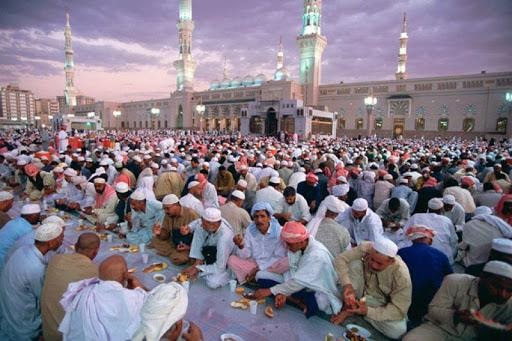
Photo: Breaking the fast collectively in Madinah
Generosity towards others does not stop at the family and friendship circle. Huge free public feasts called mawâ'id ar-rahmân are organized by non-governmental organizations in Muslim countries to feed the poor and the orphans.
Narrated Abu Musa Al-Ash`ari, the Prophet (ﷺ) said15:
"Give food to the hungry, pay a visit to the sick, and release (set free) the one in captivity (by paying his ransom)."
أَطْعِمُوا الْجَائِعَ، وَعُودُوا الْمَرِيضَ، وَفُكُّوا الْعَانِيَ ". قَالَ سُفْيَانُ وَالْعَانِي الأَسِيرُ.
Sociologically speaking, fasting is an expression of solidarity with the poor. It manifests itself through the concept of charity, neighborliness, and hospitality. In addition to helping to purify the body and soul through the process of self-purification, addressing these areas of social importance can only help people to rid themselves of all those things that are not socially desirable.
Charity is strongly encouraged during the month of fasting. This includes helping the poor by giving alms. It is estimated that if a person gives even a small amount during this month, he or she will receive 70 times more blessings in return.
Self-Reform and Self-Discipline
This is an elaborate process of self-reform and self-restraint and involves a wide range of responsibilities on the part of those who observe the fast. It also helps to strengthen the powers of self-control, to abstain from natural human impulses by exercising capacity for self-restraint, which leads to self-improvement. On the spiritual level, it helps to reach the proximity of God. It is a form of self-training in the hope that these qualities will extend beyond this month and remain with the faithful throughout the year.
Psychologically, it is a belief that this month-long process is the best instrument for shaping the behavior of its practitioners so that they become ideal human beings. It essentially implies that a person observing the fast will not only observe abstinence from eating and drinking but will put himself in a sublime state of mind in order to develop positive feelings. Therefore, fasting strengthens impulse control and helps to develop good behavior. This purification of the soul and body harmonizes the inner and outer spheres of an individual. True observance leads to a sense of inner peace and tranquility, so necessary during the period of confinement.
In addition, one must refrain from listening, speaking, hearing, or thinking negatively about others. If one applies such restraint and goes through this self-purification process for a period of one month, one expects its impact to last for at least the remaining 11 months, when this process is repeated again. Unfortunately, we consider this to be only a physical fast and do not strive to achieve what is expected from this great and important month.
Ramadan is about self-control and restraint, as stated by Anisa Mehdi in Forbes16:
“No matter where a fasting Muslim may be, Ramadan is a call for an internal spiritual and physical cease-fire. The point of the fast is to worship the Divine by demonstrating control over earthly desires -- typically food, drink, tobacco and sex -- during daylight hours. It is also an opportunity to demonstrate "high road" values -- being gracious, generous, and gentle -- toward others no matter how cranky or irritated you might be, especially when your blood sugar plummets and your mouth is too dry to speak. The combination of physical and spiritual self-awareness is a test of character: When your stomach growls from hunger will you snap at your pesky child? Your thoughtless neighbor? A careless colleague? The boorish driver who cut you off? Or will you remain peaceful, practicing the patience and graciousness you promised yourself and your Creator? A practice it is, replete with discoveries and acknowledgments of imperfection and abounding with opportunities to ask forgiveness and try again."
Ramadan In the Time of Pandemic
In Ramadan, mosques are an essential component that furnishes the daily life during this month of recollection where fasting and the mosque are not only good household in the collective imagination of Muslims, as evidenced by their enthusiasm for the houses of God on the occasion of the five prayers but also for those of Tarâwih. An enthusiasm that overflows every year the mosques and their esplanades and even the expansions of fortune installed to accommodate the many faithful.
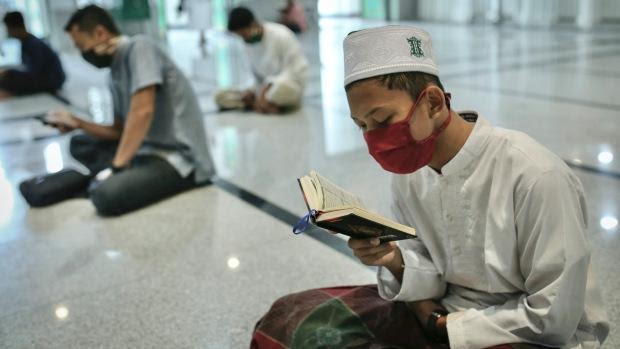 Photo: Ramadan during the pandemic
Photo: Ramadan during the pandemic
However, this year those with minds attached to the collective prayer wonder what will look like a Ramadan without gatherings in mosques, behind the imams, the days of Friday prayers, Tarâwih and Laylat al-Qadr.
These questions have been examined by the Ulema scholars with much wisdom and hindsight, in accordance with the precepts of Islamic Sharî’ah that govern the lives of Muslims in times of peace as well as in times of war, during periods of safety as well as in situations of fear and calamity.
While Muslim governments have responded to the unprecedented health crisis with vigilance and firmness to prevent the spread of the pandemic, the Supreme Councils of Ulema in several Muslim countries and communities issued fatwas on recommending the temporary closure of mosques and the suspension of collective prayer until the situation returns to normal, in accordance with the Shari’ah, which calls for the protection of the body and for putting the interest above the prejudice.
Drawing on the principles of ease and mercy advocated by the Muslim religion, the closure of mosques does not mean the cessation of prayers and Qur’anic recitation, as long as the faithful can make their homes into mosques.
It was narrated from Zayd ibn Thaabit that the Messenger of Allah (peace and blessings of Allah be upon him) made a cubicle – made from a reed mat – in Ramadan, in which he prayed at night. Some of his companions prayed behind him, and when he realized they were there he sat down. Then he went out to them and said17:
“I know how keen you are to pray behind me. O people, pray in your houses, for the best of prayer is a man’s prayer in his house, apart from the prescribed prayers.”
It was narrated, also, from Ibn ‘Umar that the Prophet (peace and blessings of Allaah be upon him) said18:
“Perform some of your prayers in your houses and do not make them graves.”
On this particular point, Al-Haafiz ibn Hajar said19:
“The apparent meaning is that this includes all naafil prayers because what is meant by the prescribed prayers is the obligatory prayers. But it may be interpreted as referring to all those for which it is not prescribed to offer them in the congregation and those which are not to be offered specifically in the mosque, such as the two rak’ahs for “greeting the mosque.”
Thus, the Covid-19 pandemic offers an opportunity to better understand the purpose of devotional rites and practices that are not limited to the social manifestations of religion but appeal to the essence of religion.
In this context, the ulema stressed that originally the principle of Tarâwîh is that they are performed in homes, as recommended by the authentic hadith of the Prophet given here above. Tarâwih in mosques was allowed to help the neglectful to get used to the prayers in time to get closer to God.
The Prophet, peace, and blessings of Allah be upon him, did not make the collective performance of Tarâwih an obligation. This prayer was performed individually at the time of Abu Bakr Al-Siddiq before it started to be performed collectively under Umar Ibn Al-Khattab.
Moreover, the advent of Ramadan in these circumstances is a test of determination, mobilization, and re-evaluation of concepts, as well as an opportunity for those who have worked hard, each from his or her position, to control the spread of the pandemic, and who have done so with patience and perseverance.
Conclusion
Different types of fasting (siyâm) are present in Islam. Fasts of an expiatory nature make up for a fault committed. There are those that replace a religious duty that one is unable to perform. And the fasts that are voluntarily practiced as part of asceticism. The fast of Ramadan is different from these because it is at the very foundation of Islam as a religion. It is instituted as a manifestation of homage to God and thus has a sacred, obligatory and festive character.
Fasting increases devotion and brings a Muslim closer to the Creator. It creates the recognition that everything we have in this life is a blessing from Him. It teaches self-control or restraint, and thus good manners, good speech, and good habits.
Great merits and rewards - both physical and spiritual - can be derived from fasting. The physiological effect of fasting includes lowering blood sugar, lowering cholesterol, and lowering systolic blood pressure. In fact, Ramadan fasting would be an ideal recommendation for the treatment of mild to moderate, stable, non-insulin diabetes, obesity, and essential hypertension.
As it is said in the Qur'an, Allah promises forgiveness and a great reward for a fasting person (Qur’an, 33: 35):
“Surely the men who submit (to Allah) and the women who submit (to Allah), the men who have faith and the women who have faith, the men who are obedient and the women who are obedient, the men who are truthful and the women who are truthful; the men who are steadfast and the women who are steadfast, the men who humble themselves (to Allah) and the women who humble themselves (to Allah), the men who give alms and the women who give alms, the men who fast and the women who fast, the men who guard their chastity and the women who guard their chastity, the men who remember Allah much and the women who remember Allah much: for them has Allah prepared forgiveness and a mighty reward. “
إِنَّ الْمُسْلِمِينَ وَالْمُسْلِمَاتِ وَالْمُؤْمِنِينَ وَالْمُؤْمِنَاتِ وَالْقَانِتِينَ وَالْقَانِتَاتِ وَالصَّادِقِينَ وَالصَّادِقَاتِ وَالصَّابِرِينَ وَالصَّابِرَاتِ وَالْخَاشِعِينَ وَالْخَاشِعَاتِ وَالْمُتَصَدِّقِينَ وَالْمُتَصَدِّقَاتِ وَالصَّائِمِينَ وَالصَّائِمَاتِ وَالْحَافِظِينَ فُرُوجَهُمْ وَالْحَافِظَاتِ وَالذَّاكِرِينَ اللَّهَ كَثِيرًا وَالذَّاكِرَاتِ أَعَدَّ اللَّهُ لَهُم مَّغْفِرَةً وَأَجْرًا عَظِيمًا
And when one combines these meritorious acts such as prayer, fasting, and charity (three of the five pillars of Islam) during the month of Ramadan, which is described as a month of blessing when the Qur'an was revealed, Allah promises immense rewards. Muhammad (PBUH), Allah's Messenger said:
"Whoever observes fasts during the month of Ramadan out of sincere faith, and hoping to attain Allah's rewards, then all his past sins will be forgiven."
مَنْ صَامَ رَمَضَانَ إِيمَانًا وَاحْتِسَابًا غُفِرَ لَهُ مَا تَقَدَّمَ مِنْ ذَنْبِهِ .
Endnotes:
- Sheikh Mubarak Ahmad. “Fasting in Islam and other religions, “The Weekly Al Hakam dated June 10, 2019. https://www.alhakam.org/fasting-in-islam-and-other-religions/
- Mike Buchman. “Ramadan: A spiritual journey of purification & compassion, “Groundviews Blog dated July 16, 2015. https://www.solid-ground.org/purification-and-compassion/
- Reference: Sunan an-Nasa'i 5027
In-book reference: Book 47, Hadith 43
English translation: Vol. 6, Book 47, Hadith 5030 - Yom Kippur—the Day of Atonement—is considered the most important holiday in the Jewish faith. Falling in the month of Tishrei (September or October in the Gregorian calendar), it marks the culmination of the 10 Days of Awe, a period of introspection and repentance that follows Rosh Hashanah, the Jewish New Year. According to tradition, it is on Yom Kippur that God decides each person’s fate, so Jews are encouraged to make amends and ask forgiveness for sins committed during the past year. The holiday is observed with a 25-hour fast and special religious service. Yom Kippur and Rosh Hashanah are known as Judaism’s “High Holy Days.” (https://www.history.com/topics/holidays/yom-kippur-history).
- Cultural Awareness International. “Fasting around the World, “Culturalawareness.com dated January 22, 2015. https://culturalawareness.com/fasting-around-the-world/
- Tisha B'av is the ninth day of the Jewish month of Av, which usually falls in July or August in the western calendar. It is a solemn occasion because it commemorates a series of tragedies that have befallen the Jewish people over the years, many of which have coincidentally happened on this day. Tisha B'av is observed with prayers and fasting. Shaving and the wearing of cosmetics and leather are banned, and people are also expected to refrain from smiles, laughter, and idle conversation. All ornaments are removed from synagogues and lights are dimmed. The ark (where the Torah is kept) is draped in black.
- Jesus is said to have stayed in the wilderness, without food, for 40 days (Matthew 4:2; Mark 1-13 and Luke 4:2).
- Book of Common Prayer (BCP) is the short title of a number of related prayer books used in the Anglican Communion, as well as by other Christian churches historically related to Anglicanism. The original book, published in 1549 in the reign of Edward VI, was a product of the English Reformation following the break with Rome. The work of 1549 was the first prayer book to include the complete forms of service for daily and Sunday worship in English. It contained Morning Prayer, Evening Prayer, the Litany, and Holy Communion and also the occasional services in full: the orders for Baptism, Confirmation, Marriage, "prayers to be said with the sick", and a funeral service. It also set out in full the "propers" (that is the parts of the service which varied week by week or, at times, daily throughout the Church's Year): the introits, collects, and epistle and gospel readings for the Sunday service of Holy Communion. Old Testament and New Testament readings for daily prayer were specified in tabular format as were the Psalms; and canticles, mostly biblical, that were provided to be said or sung between the readings. Cf. Careless, Sue. Discovering the Book of Common Prayer: A hands-on approach (Volume 1: Daily Prayer), Toronto: Anglican Book Centre Publishing, 2003: 26.
- The Didache, also known as The Lord's Teaching Through the Twelve Apostles to the Nations, is a brief anonymous early Christian treatise written in Koine Greek, dated by modern scholars to the first century. The first line of this treatise is "The teaching of the Lord to the Gentiles (or Nations) by the twelve apostles". The text, parts of which constitute the oldest extant written catechism, has three main sections dealing with Christian ethics, rituals such as baptism and Eucharist, and Church organization. The opening chapters describe the virtuous Way of Life and the wicked Way of Death. The Lord's Prayer is included in full. Baptism is by immersion, or by affusion if immersion is not practical. Fasting is ordered for Wednesdays and Fridays. Two primitive Eucharistic prayers are given. Church organization was at an early stage of development. Itinerant apostles and prophets are important, serving as "chief priests" and possibly celebrating the Eucharist. Meanwhile, local bishops and deacons also have authority and seem to be taking the place of the itinerant ministry. (Cf. https://en.wikipedia.org/wiki/Didache).
- Lent (Latin: Quadragesima, 'Fortieth') is a solemn religious observance in the Christian liturgical calendar that begins on Ash Wednesday and ends approximately six weeks later, the night before Easter Sunday. The purpose of Lent is the preparation of the believer for Easter through prayer, mortifying the flesh, repentance of sins, almsgiving, simple living, and self-denial. This season is observed in the Anglican, Eastern Orthodox, Lutheran, Methodist, Moravian, Oriental Orthodox, Reformed (including Presbyterian and Congregationalist), United Protestant, and Roman Catholic Churches. Some Anabaptist, Baptist, and nondenominational Christian churches also observe Lent.The last week of Lent is Holy Week, starting with Palm Sunday. Following the New Testament story, Jesus' crucifixion is commemorated on Good Friday, and at the beginning of the next week, the joyful celebration of Easter Sunday recalls the Resurrection of Jesus Christ. (Cf. https://en.wikipedia.org/wiki/Lent) Cf. Thurston, Herbert (1904). Lent and Holy Week. London: Longmans Green, 1904.
- Reference: Sahih al-Bukhari 38In-book reference: Book 2, Hadith 31
USC-MSA web (English) reference: Vol. 1, Book 2, Hadith 38
https://sunnah.com/bukhari:38 - Ṣaḥīḥ al-Bukhārī 1797, Ṣaḥīḥ Muslim 1152 https://www.abuaminaelias.com/dailyhadithonline/2011/08/02/gate-paradise-fasting/
- Geneive Abdo. “To Fast or Not to Fast—That Is the Coronavirus Question for Ramadan, “Foreign Policy dated July 23, 2020. https://foreignpolicy.com/2020/04/23/ramadan-coronavirus-fasting-iftar/
- Ṣaḥīḥ Muslim 2699.
https://www.abuaminaelias.com/dailyhadithonline/2012/01/15/allah-helps-brother/ - Reference: Sahih al-Bukhari 5373In-book reference: Book 70, Hadith 1USC-MSA web (English) reference: Vol. 7, Book 65, Hadith 286. https://sunnah.com/bukhari/70
- Anisa Mehdi. “The importance of Ramadan, “Forbes dated June 1, 2017. https://www.forbes.com/sites/stratfor/2017/06/01/the-importance-of-ramadan/?sh=734a6c9e43b2
- Narrated by al-Bukhaari, 698; Muslim, 781 https://islamqa.info/en/answers/22209/it-is-better-to-offer-naafil-prayers-at-home
- Narrated by al-Bukhaari, 422; Muslim, 777 https://islamqa.info/en/answers/22209/it-is-better-to-offer-naafil-prayers-at-home
- https://islamqa.info/en/answers/22209/it-is-better-to-offer-naafil-prayers-at-home
Topics: History, Interfaith, Ramadan, Ummah (Community) Channel: Ramadan - Day 1
Views: 3709
Related Suggestions







